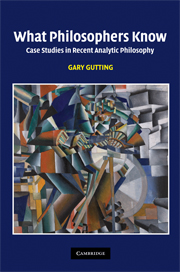Book contents
- Frontmatter
- Contents
- Acknowledgments
- Introduction
- PART I HOW DOES THAT GO? THE LIMITS OF PHILOSOPHICAL ARGUMENT
- PART II ARGUMENTS AND CONVICTIONS
- 5 Turning the tables: Plantinga and the rise of philosophy of religion
- 6 Materialism and compatibilism: two dogmas of analytic philosophy?
- 7 Was there a Kuhnian revolution? Convictions in the philosophy of science
- 8 Conviction and argument in Rawls' A Theory of Justice
- PART III PHILOSOPHICAL TRUTH AND KNOWLEDGE
- References
- Index
7 - Was there a Kuhnian revolution? Convictions in the philosophy of science
Published online by Cambridge University Press: 05 June 2012
- Frontmatter
- Contents
- Acknowledgments
- Introduction
- PART I HOW DOES THAT GO? THE LIMITS OF PHILOSOPHICAL ARGUMENT
- PART II ARGUMENTS AND CONVICTIONS
- 5 Turning the tables: Plantinga and the rise of philosophy of religion
- 6 Materialism and compatibilism: two dogmas of analytic philosophy?
- 7 Was there a Kuhnian revolution? Convictions in the philosophy of science
- 8 Conviction and argument in Rawls' A Theory of Justice
- PART III PHILOSOPHICAL TRUTH AND KNOWLEDGE
- References
- Index
Summary
It is by now a banality that Thomas Kuhn's book on scientific revolutions itself precipitated an intellectual revolution. Certainly, the book has had a startlingly wide influence. As John Zammito says, “no other work in the history of philosophy of science has been so widely read, discussed, or appropriated by the entirety of the literate public” (52). And even beyond the literate public, we may think, noting that “paradigm” has become part of standard business babble or – as I serendipitously read in today's newspaper – that a rock star earnestly avows that her new album is a “paradigm-shift” for her.
But the question remains of where, if anywhere, Kuhn's effect was deep enough to be judged truly revolutionary. Certainly not in the history of science, where Kuhn himself purported to be offering nothing that historians had not known and been practicing since Koyré. Not even, it might seem, in philosophy of science, to which Kuhn intended his book to be a contribution. There he undeniably created a major stir, but, as Zammito notes, “by 1980, it is fair to say, Kuhn had become a marginal figure for the philosophy of science” (53). More than twenty-five years later the judgment of marginality seems reaffirmed. The grand Kuhnian issues of rationality and truth are no longer central to the discipline. Most of the best philosophy of science consists of highly specialized discussions in the conceptual foundations of specific disciplines, particularly physics, biology, and cognitive science.
- Type
- Chapter
- Information
- What Philosophers KnowCase Studies in Recent Analytic Philosophy, pp. 151 - 172Publisher: Cambridge University PressPrint publication year: 2009



